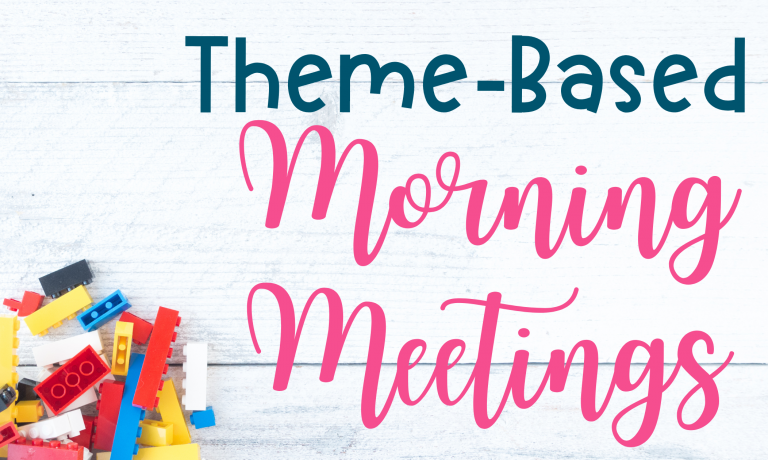A theme-based morning meeting can be an incredibly interactive experience for students in our classroom communities. Students are able to stay engaged in a variety of ways and learn new things when we integrate themes into our morning meetings.
What is a Theme-Based Morning Meeting?
My morning meetings rely on themes in literature as the thread that ties the learning sequence together. Each phase of the morning meeting framework works to develop students’ understanding of a theme while at the same time teaching social/emotional skills, addressing character education, and strengthening our classroom community. The five phases of the theme-based morning meeting framework are the main focus of the rest of this training.
A theme-based morning meeting is a routine classroom experience that allows students the opportunity to develop personally, academically, and socially. We do this through the use of self-reflection, read-aloud, songs, videos, quotations, key vocabulary, classroom discussions, and you, the teacher as a trusted guide.
Things to Note
The style of the morning meeting I’m going to describe to you is mostly teacher-led, but students have a voice through many opportunities for discussion. Chants, morning messages, and different greetings are not included in this framework, but you can add those in if you want. These morning meetings should take around 15 to 20 minutes and these meetings and lessons can take place at any time of the day, although most teachers prefer mornings when it’s possible because this gives students a chance to reconnect, set a positive tone for the day ahead, and allow students the opportunity to ease into the learning environment.
Why Implement Theme-Based Morning Meetings?
Cohesion
Theme-based morning meetings help you to create natural cohesion and a path for morning meetings, making them easier to plan for, rather than meetings being disjointed or jumping from topic to topic, and rather than having to invest tons of time planning a new morning meeting topic each day.
Organization
Theme-focused morning meetings allow me to be more organized. Within the expected structure of my morning meeting routine, I can still be very creative in how I share the theme with students and how I provoke discussions. YouTube videos, songs, and lyrics, picture books, poems, mini-activities and projects, current events, artwork, memes, or just a simple question for students to respond to. The possibilities are seriously endless, but any and every creative teaching idea fits into the routine when the activity is part of building an understanding of the focused theme.
Integration
Designing my community meetings to that important themes is the driving force that has increased my commitment to consistently holding community meetings because the theme-based approach allows me the regular opportunity to teach important literacy skills in addition to what we learn in the reader’s workshop. As I expose students to new themes, teach related vocabulary, and read multiple books on the same theme, I am able to target how authors build a theme, analyze an author’s message, teach students to compare and contrast literature, and because of this, I’m not really taking time away from my classroom by adding morning meetings into our schedule. I am complementing and increasing the meaning behind everything we do, especially in our literacy block. When I know and believe that these meetings compliment my literacy instruction, it makes me more committed to sticking to my community meeting routine.
Consistency
Focusing on a theme also makes it easier to stay consistent with morning meetings, because our learning and discussions carry on into the following days and build for a few weeks. By organizing your morning meetings through themes in literature, you allow students the time and space to develop big ideas.
